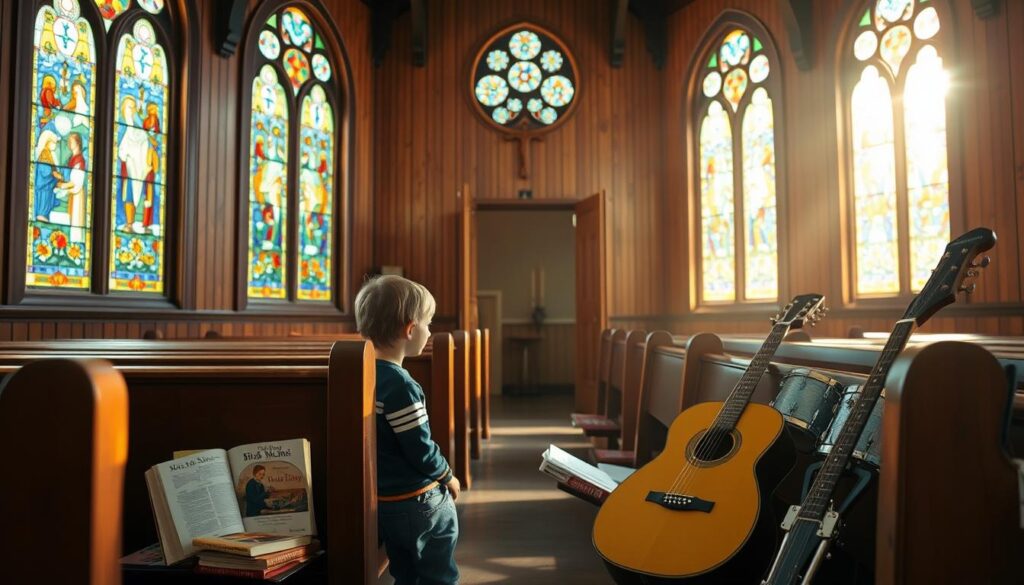Dave Grohl, the lead singer of Foo Fighters, has won fans all over with his amazing shows and energy. But what’s behind his public image? Does he still believe in Christianity, or has his faith changed? Let’s look into Grohl’s spiritual side and how his beliefs have grown.
Key Takeaways
- Dave Grohl was raised in a devout Christian family, with his mother serving as a Sunday school instructor.
- Grohl’s early songwriting and performances contained references to spirituality and questions about faith.
- The Foo Fighters’ music rarely references religion, focusing instead on personal experiences and universal themes.
- Grohl has made ambiguous statements about his personal faith, often emphasizing the importance of questioning everything, including religion.
- Grohl’s lifestyle and artistic choices have faced criticism from some religious groups, leading to speculation about his beliefs.
Dave Grohl’s Christian Upbringing and Background
Dave Grohl, the famous frontman of Foo Fighters and former Nirvana drummer, grew up in a Christian home. Church was a big part of his life, giving him a strong spiritual base. This base would later shape his music and career.
Grohl’s Christian upbringing deeply influenced his songwriting and performances. His songs, like “My Hero” and “Everlong,” often touched on spiritual themes. This shows how his faith has connected with fans all over the world.
Mother’s Role as Sunday School Instructor
Grohl’s mother was a Sunday school teacher. He saw her dedication to teaching Christianity. This had a big impact on his faith and understanding of Christianity.

Grohl’s Christian upbringing and the religious influences in his early life are fascinating. His complex relationship with spirituality is a key part of his artistic journey.
Dave Grohl’s Ambiguous Statements on Personal Faith
Dave Grohl hasn’t shared much about his religious beliefs publicly. Yet, he’s made comments that hint at a complex view of religion. He seems to be always curious and ready to question everything, including religion.
Grohl also doesn’t like to be labeled with any specific belief system. He values individualism and freedom to explore various ideas. This makes his stance on religion quite ambiguous.
Questioning Religion
Grohl once said, “I question everything, including religion. I’m not religious, but I’m very spiritual.” This shows he’s not tied to any faith, but still thinks deeply about spiritual matters.
No Religious Label
When asked about his religious views, Grohl usually keeps things vague. He believes, “I don’t like to label myself under any one belief system. It’s key to stay open-minded and explore different spiritual views.”

This way of looking at religion and spirituality shows Grohl’s love for individuality. He wants to keep his beliefs and views free from strict labels.
Secular Lyrics and Music Content
The Foo Fighters’ songs mainly talk about life’s everyday moments and feelings we all share. Dave Grohl’s songs rarely mention religion or spirituality. This makes their music appealing to many people, no matter their beliefs.
The Foo Fighters are known for their secular rock music. Their songs cover topics like love, loss, and what it means to be human. Grohl’s songs come from his own life and what he sees in the world.
| Foo Fighters Song | Worldly Theme |
|---|---|
| “The Pretender” | Societal pressures and conformity |
| “My Hero” | Admiration for ordinary people |
| “Learn to Fly” | Overcoming personal challenges |
The Foo Fighters connect with listeners by focusing on common themes. This way, they reach out to people from all walks of life. Their music has made them famous and respected, as they keep exploring the human experience through their non-religious music.

Is Dave Grohl A Christian?
Dave Grohl was raised in a Christian family. But his music and life don’t follow traditional Christian ways. The Foo Fighters’ songs rarely talk about religion or spirituality.
Foo Fighters’ Songs Lack Spiritual Content
Grohl writes about personal stories, love, and common feelings in Foo Fighters’ songs. The band’s music connects with many people. It talks about life’s everyday moments, not specific religious views.
Grohl Keeps His Faith Private
In his book The Storyteller: Tales of Life and Music, Grohl talks about his Catholic upbringing. But he doesn’t say he’s a Christian as an adult. He keeps his spiritual views to himself, not sharing them with the world.
| Foo Fighters Album | Number of Songs with Religious/Spiritual Themes | Number of Songs with Secular Themes |
|---|---|---|
| The Colour and the Shape (1997) | 0 | 12 |
| There Is Nothing Left to Lose (1999) | 0 | 12 |
| One by One (2002) | 0 | 11 |
| In Your Honor (2005) | 0 | 16 |
The table shows Foo Fighters’ songs mostly deal with secular topics. There are no songs about religion or spirituality. Grohl’s lyrics touch on universal human experiences, not pushing any faith.

In summary, Dave Grohl was raised Christian but doesn’t show it in his adult life or music. The Foo Fighters’ songs and Grohl’s stories focus on the human experience through a secular view. They don’t highlight Christian or spiritual themes.
Lifestyle Not Aligned With Christian Values
Dave Grohl’s public image and actions have faced a lot of criticism. Some say his lifestyle doesn’t match Christian values. His history of drug and alcohol abuse is a big concern. He has talked openly about it, which goes against Christianity’s teachings on sobriety.
Also, Grohl’s use of explicit language and content has raised eyebrows. He often uses profanity and performs in ways that might offend some. This behavior is seen as not fitting with Christian morals.
The Foo Fighters have also faced criticism from certain religious groups. These groups don’t agree with the band’s music content. They see a gap between Grohl’s music and their religious beliefs.
There are also rumors and speculation about Grohl’s interest in the occult and other fringe ideas. Even though these rumors aren’t proven, they make some think Grohl’s beliefs are different from mainstream Christianity. It’s key to be careful with such rumors and respect Grohl’s privacy and beliefs.

Dave Grohl’s Complex Relationship with Religion
For Dave Grohl, religion and spirituality are deeply personal. He was raised in a Christian family. But as he grew older and became famous, his views on religion changed.
He rarely talks about his beliefs or which religion he follows. Grohl seems to question organized religion. He prefers to explore spirituality on his own terms.
Even though he was raised Christian, his music doesn’t often touch on religious themes. Foo Fighters’ songs usually deal with everyday life, not spiritual matters.
| Grohl Spiritual Views | Grohl Religious Journey | Grohl Personal Faith |
|---|---|---|
| Reluctant to openly discuss his beliefs | Distanced himself from organized religion | Prefers to keep his spiritual side private |
| Expresses a sense of questioning and skepticism towards organized religion | Raised in a Christian household, but his views have evolved over time | Maintains an individualistic and introspective approach to spirituality |
| His musical content and public persona rarely reflect overt religious themes or references | Seems to have a complex and ambiguous relationship with religion | Does not outwardly identify with any particular faith as an adult |
Today, Dave Grohl’s views on religion are complex. He has moved away from organized religion. He keeps his spiritual journey private, focusing on his music and creativity.
“I don’t believe in anything. I’m not a religious person, I’m not a spiritual person. I’m just here for the music.”
Conspiracy Theories Surrounding Dave Grohl’s Success
Dave Grohl’s success has led to many Grohl conspiracy theories and Grohl satanism rumors. Some believe he made deals with the devil or practiced occult to get where he is. These Grohl music industry myths have spread widely.
The tragic deaths of famous musicians have fueled these theories. Kurt Cobain’s sudden death has especially sparked rumors about Grohl’s rise to fame.
These theories show how people look for hidden reasons behind music industry challenges and tragedies. Grohl’s success is undeniable, but these rumors highlight our need to understand the unexplainable. They also show our willingness to believe in stories without proof.
The Grohl conspiracy theories, Grohl satanism rumors, and Grohl music industry myths remind us of the risks of spreading false information. It’s vital to think critically about sensational claims. As the music world grows, we must focus on real achievements, like Dave Grohl’s, rather than baseless stories.
Rock Music and Artist Deaths: A Tragic Pattern
The rock music scene has seen many sad losses, like the death of Taylor Hawkins, the drummer of Foo Fighters. Fans and the music world are mourning. These rock star deaths and music industry tragedies have become a pattern. Artists like Dave Grohl have been deeply affected by these losses.
Some might look for hidden meanings in these tragic events. But, life is unpredictable, and not everything has a secret reason. The deaths of Kurt Cobain and Taylor Hawkins are a source of sadness. It’s important to understand and empathize rather than speculate.
Fans and musicians share a strong bond. Fans often feel a deep connection with their favorite artists. The media’s coverage of rock star deaths and the public’s emotional investment can make it seem like there’s a bigger meaning.
It’s okay to feel grief and shock over these losses. But, we must remember that artists’ personal lives are complex and not always known to us. As fans, we should be compassionate and avoid making up hidden meanings or conspiracy theories about these music industry tragedies.
“The loss of talented artists like Kurt Cobain and Taylor Hawkins is undoubtedly a source of grief, but it is crucial to approach these situations with empathy and understanding rather than speculation.”
The rock star deaths and music industry tragedies remind us of life’s fragility and the challenges of the industry. As fans, we should support and appreciate our favorite musicians. We should also recognize their humanity and the complex challenges they face. By being compassionate and understanding, we can honor the legacy of lost artists and work towards a more supportive music industry.
Conclusion
Dave Grohl was raised in a Christian home but doesn’t openly follow any religion as an adult. His Grohl religious identity and Grohl spiritual journey show a Grohl faith ambiguity. He has stepped away from organized religion and keeps his spiritual side to himself.
Grohl’s journey highlights the many ways people can deal with their beliefs. It shows the value of respecting each person’s spiritual path.
Grohl’s views on religion are complex, and his music is secular. This has led to criticism from some religious groups. Yet, his music connects with many, showing music’s power to unite people beyond beliefs.
As Grohl looks back on his career, his spiritual journey is still a mystery. By keeping his beliefs private, he inspires fans to find their own ways. His music and writing touch on universal themes, offering solace and meaning to all.
FAQ
Was Dave Grohl raised in a Christian family?
Yes, Dave Grohl grew up in a Christian family. He went to church often as a kid. His faith shaped his views and early music.
How did Grohl’s mother influence his religious beliefs?
Grohl’s mom taught Sunday school, making faith important to him. He saw her passion for teaching Christianity. This deeply influenced his beliefs.
Does Dave Grohl openly identify with any particular religion as an adult?
No, Dave Grohl doesn’t identify with any religion as an adult. He has made statements that show a complex view of religion. He seems curious and open to questioning everything, including religion.
How do Grohl’s lyrics and musical content reflect his spiritual views?
Foo Fighters’ songs focus on personal experiences and emotions, not religion. Grohl’s songs rarely mention faith. This makes their music appealing to many, regardless of their beliefs.
Is Dave Grohl’s lifestyle consistent with Christian values?
No, Grohl’s life and career don’t follow Christian values. He has struggled with drugs and alcohol. His use of explicit language also goes against Christian teachings.
How have some religious groups reacted to the Foo Fighters’ music?
Some religious groups have criticized Foo Fighters. They say the band’s music doesn’t match their beliefs. This criticism comes from the band’s secular themes.
Are there any conspiracy theories surrounding Dave Grohl’s success?
Yes, rumors suggest Grohl might be interested in the occult. These rumors haven’t been proven. They add to the idea that Grohl’s beliefs might not be traditional Christian.

